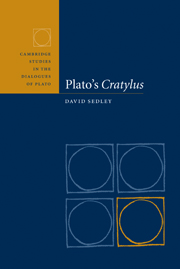Chapter 3 - Linguistic science
Published online by Cambridge University Press: 22 September 2009
Summary
CONVENTIONALISM
As the Cratylus opens, Hermogenes is begging Socrates to intervene in a quarrel which has already been running heatedly off-stage. This device is our first intimation that the topic to be addressed is not one from the historical Socrates' regular repertoire.
Cratylus has been affirming his doctrine that each existing thing, including each human individual, has one naturally correct name: the mere fact that people may customarily call it something else does not make that its name. No one is likely to doubt that Cratylus, for all his reticence about explaining it, has a worked out theory of names, the one which has come to be known as linguistic ‘naturalism’. It is an easy and regular assumption that Hermogenes is an adherent of the other wing, the ‘conventionalist’ party. In a way this is true: he is the voice of linguistic conventionalism, and, as he says, he holds his opinion after having often discussed the question with Cratylus and others (384c–d). But we should not go too far in calling him the adherent of any theory. For he declares his readiness to abandon his view if anyone can explain to him how and why to do so (384d–e), and, as good as his word, he does exactly that as soon as Socrates provides the required lead.
- Type
- Chapter
- Information
- Plato's Cratylus , pp. 51 - 74Publisher: Cambridge University PressPrint publication year: 2003

